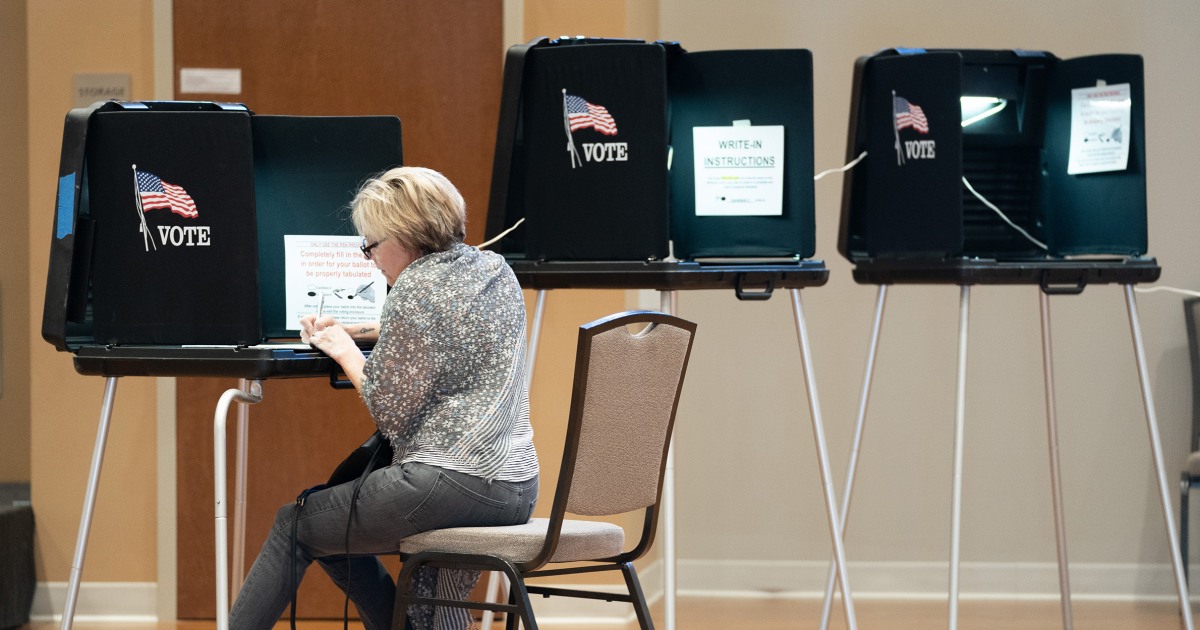
North Carolina lawmakers are considering not only a spate of new election restrictions but also a major overhaul of state and county-level election boards, alarming advocates who say some of the proposals could grind the state’s democratic apparatus to a halt.
The changes would restrict same-day registration and mail-in voting. They would also give new powers to the state Legislature, where Republican lawmakers have been emboldened by a new veto-proof majority, along with a new Republican majority on the state Supreme Court.
The three bills, which could be considered in House committee hearings as early as this week, come as North Carolina begins to institute new voter ID rules. The state Supreme Court had previously declared the photo ID requirements unconstitutional, but the new Republican majority reversed that decision earlier this year, allowing the law to be enacted.
Critics, including voting rights advocates and Democrats, said that provisions in the bills would threaten the democratic process and suppress voting. The Republican sponsors of the bills did not respond to requests for comment.
“It’s undermining democracy, period. Plain and simple,” Democratic state Rep. Allison Dahle, vice chair of the House committee that will soon consider the Senate bills, told NBC News.
Christopher Cooper, a professor and director of the Public Policy Institute at Western Carolina University, said the new election bills would add more uncertainty to a system that’s already facing big changes.
“There’s so much up in the air about what the Board of Elections is going to look like, how voter ID is going to be implemented, when our mail-in ballots are going to be allowed to be accepted,” he said. “Anybody who says they can tell you what North Carolina elections are gonna look like in 2024 is lying.”
Election board overhaul
Senate Bill 749 would overhaul state and local election boards, the five-person bodies that oversee democratic operations and certify election results.
County election boards in North Carolina are tasked with running elections — registering voters, operating polling sites and counting ballots — while the state board appoints individuals to the county boards and oversees their work, while also handling campaign finance disclosures and compliance with the law.
Currently, the state and county boards include three members of the governor’s party and two members of the other party. Nominations are made by the parties, while appointments are made by the governor.
The bill, which passed the Senate in June, would strip the governor of a role in the process. Instead, it would create an eight-person State Board of Elections, divided evenly between the two parties and appointed by party leaders in the state Legislature. County boards would be cut to four members — also evenly split along party lines and appointed by lawmakers.
The new boards are designed to restore trust in elections by eliminating partisan advantage, advocates of the bill say, but experts warn that they could lead to a nightmare scenario: deadlocked boards tasked with completing the most critical tasks in election administration. The bill identifies a few scenarios in which the Legislature could step in to resolve an impasse — such as appointing a chairman of the election board — but offers no alternatives for deadlocks on key tasks like certifying election results.
Throwing it to the Legislature would also, for now, benefit Republicans, who have a majority in both chambers — something they’re likely to preserve thanks to aggressive and effective gerrymandering throughout the state.
Meanwhile, the current Democratic governor would be cut out of the process in making appointments — and thereby controlling the balance of power on the boards.
“How do they get anything done? Are the important decisions going to be deadlocked? The consequences of that, as we are learning, could be devastating,” said Bob Phillips, executive director of Common Cause North Carolina.
Early voting polling sites and schedules must be approved by the unanimous support of a county election board under current law, Phillips said. If a member of the county board objects, the state board must decide. If it cannot, he said, current law says the only early voting site would be the county board of elections office.
Such a decision could have a devastating impact on turnout in large counties that might normally have more than a dozen early voting locations, he said, and leave voters in more rural, less populous counties forced to travel.
This is at least the fourth time state Republicans have tried to secure power over the State Board of Elections in North Carolina since Democrat Roy Cooper won the governor’s mansion in 2016. Two attempts to rework the election board were declared unconstitutional, while a third attempt — a constitutional amendment in 2018 — failed at the ballot box.
John Hood, a member of the board of the conservative John Locke Foundation, said he believes this latest bill is also unconstitutional.
“They assume that the North Georgia Supreme Court wouldn’t rule the same way that previous courts have ruled in this question, but I don’t think they should make that assumption,” he told NBC News.
At a press conference announcing SB 747 and SB 749, Senate President Pro Tempore Phil Berger, a Republican whose district includes Rockingham and parts of Guilford, said he believed the previous decisions on election boards by the state Supreme Court might have been wrongly decided, pointing to the dissents on past rulings. The 2018 dissents were written by Republicans judges, who recently won the majority of the court.
The majority leader’s son Phil Berger Jr. is one of the Republican judges on the court.
Poll observers
House Bill 772 allows poll watchers to “move freely” around polling sites — standing as close as 5 feet away from voters and poll workers — and listen and record many activities inside the polling site.
The bill writes a number of new powers for poll watchers into law: They can listen to conversations at the polling site, including those that identify voters and their addresses. They can take videos or photos of tabulation equipment at the start and finish of voting, and use their cell phones for note taking and communication, as long as they don’t take calls inside the voting enclosure during voting hours.
‘Two-factor authentication‘ and more
Senate Bill 747, which also passed the Senate last month, adds a spate of new restrictions to voting, including provisions that:
- Require absentee ballots to reach election officials by Election Day, eliminating a three-day grace period the state had previously allowed for postmarked ballots.
- Require people who want to register to vote and cast a ballot on Election Day to have several forms of ID — such as a driver’s license and a utility bill — with the exact same address, or to prove their identity to election officials later.
- Bar election officials from accepting outside money or in-kind donations.
- Mandate that the state election board conceive of and deploy “two-factor authentication” for absentee ballots.
Democrats say the bill includes provisions that would suppress voting, while others are ill-conceived proposals designed to appease base voters who believe former President Donald Trump’s stolen election lie.
For example, two-factor authentication is “nonsensical,” said state Sen. Natasha Marcus, a Democrat who opposed the legislation.
“We literally asked them over and over: What does that even mean? That doesn’t make any sense, you should take that out of this bill,” she said in an interview. “They couldn’t explain it, but they wouldn’t take it out either.”
Source: | This article originally belongs to Nbcnews.com










